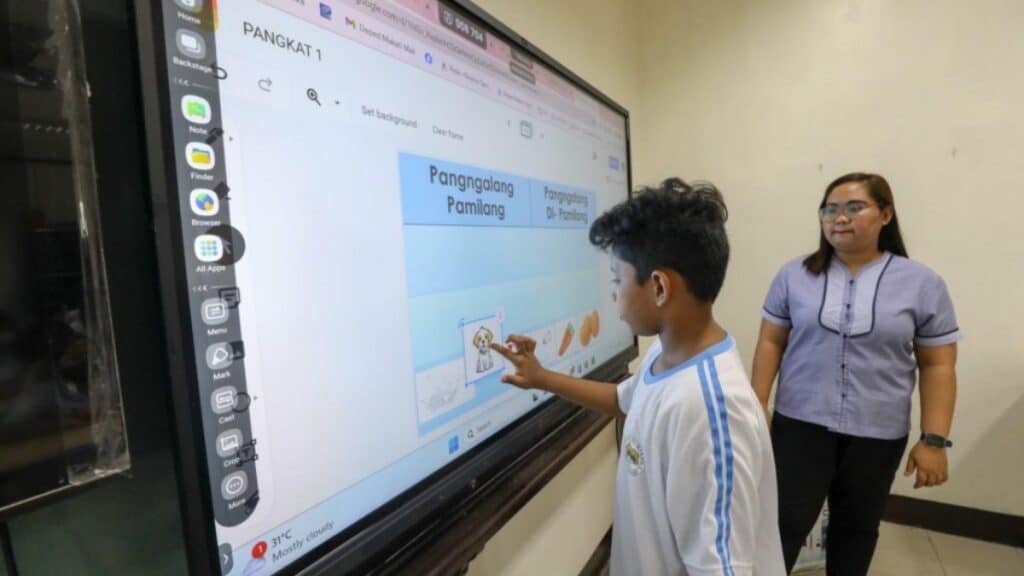Smart boards are transforming education in the Philippines by introducing interactive learning experiences that captivate and engage students. Unlike traditional chalkboards, smart boards combine visuals, audio, and real-time interactivity to make lessons more dynamic and memorable. Teachers can incorporate videos, animations, and digital resources into their lectures, helping students grasp complex concepts more easily. This interactive approach caters to different learning styles, ensuring every student benefits from the lessons.
One of the most significant impacts of smart boards is their role in bridging the digital divide. In many public and private schools, limited access to technology has hindered educational advancement. Smart boards offer a powerful solution, bringing modern technology into classrooms across the Philippines. By providing digital tools and resources, smart boards level the playing field, ensuring students from diverse backgrounds gain access to quality education. Their integration into schools supports the country’s push towards digital transformation in education.
Moreover, smart boards empower both teachers and students. For educators, lesson preparation becomes easier and more efficient with preloaded templates and digital resources. Smart boards also encourage collaborative learning by enabling students to interact directly with the board through touch or stylus. Group activities and problem-solving tasks become more engaging, fostering teamwork and critical thinking skills.
By revolutionizing classroom environments, smart boards play a vital role in enhancing learning outcomes, preparing Filipino students for a tech-driven future.
Transforming Business Operations
Smart boards are revolutionizing the way businesses operate in the Philippines by streamlining meetings and presentations. With their touch-sensitive screens and advanced features, smart boards eliminate the need for traditional whiteboards and projectors. Teams can present ideas, share content, and make real-time annotations seamlessly. This functionality not only saves time but also enhances communication by allowing all participants to stay engaged and visually involved, whether they are in the room or joining remotely.
In addition to efficient presentations, smart boards foster collaboration and innovation within organizations. The ability to share screens, annotate directly on documents, and save changes in real time makes brainstorming sessions more interactive and productive. Team members can contribute ideas simultaneously, bridging the gap between physical and virtual participants. These features are particularly valuable for industries requiring creative problem-solving and strategic planning, such as marketing, product development, and project management.
Smart boards also play a pivotal role in supporting the Philippines’ digital transformation. As more businesses embrace technology to remain competitive, smart boards serve as essential tools for building a tech-driven work environment. From enhancing employee training sessions to improving customer presentations, they align with the country’s push for innovation in business operations.
Recognizing this potential, many companies are seeking partnerships with Chinese smart board manufacturers, known for their cost-effective and high-quality products. These collaborations provide Filipino businesses with access to advanced technology at competitive prices, ensuring widespread adoption across industries. By integrating smart boards, businesses in the Philippines are taking a significant step toward improved efficiency, collaboration, and digital modernization, positioning themselves for success in a rapidly evolving global market.
Overcoming Challenges and Maximizing Opportunities
While smart boards hold immense potential to revolutionize education and business operations in the Philippines, challenges like affordability and accessibility remain significant barriers. Many schools and small businesses struggle to invest in this technology due to limited budgets. However, with the growing number of Philippines-based smart board suppliers, there are now more options offering competitive pricing and flexible payment plans. Buyers can consult price lists and manufacturers to find solutions that balance quality and cost-effectiveness, making smart boards increasingly accessible.
Another critical factor is training and adoption. Simply purchasing smart boards isn’t enough—teachers, employees, and stakeholders need proper education on how to use them effectively. Training programs are essential to maximize the technology’s capabilities, from creating interactive lessons in classrooms to optimizing collaborative features in corporate environments. Suppliers and manufacturers often provide training support, ensuring users gain confidence and competence in leveraging smart boards to their full potential.
The future outlook for smart boards in the Philippines is promising. With the continued push for digital transformation, these devices are expected to play a central role in shaping modern classrooms and business spaces. Long-term, the integration of smart boards will lead to improved learning outcomes, increased workplace productivity, and better technological literacy.
By addressing cost barriers, offering training programs, and promoting widespread adoption, the Philippines can harness the full potential of smart boards, driving progress in both education and business sectors. This forward-thinking approach ensures the nation remains competitive in an increasingly technology-driven world.
